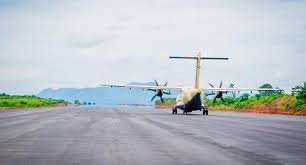Experts in the aviation industry have criticized as “unviable and unsustainable” airports newly-built or under construction in many states.
According to them, the financial burdens of the projects and continuous maintenance are too heavy for the state governments and the Federal Airport Authority of Nigeria (FAAN).
At the last count, over N369.4 billion has been sunk into such projects by 19 states.
Most of the airports remain grossly under-utilised, often recording nil flights for days and weeks, except for occasional chartered flights.
There are no commercial flights running the routes.
According to the Nigerian Civil Aviation Authority (NCAA), over a dozen states have recently built or projects are ongoing.
Some of the newly-built are: Asaba Airport; Bayelsa International Airport (Yenagoa); Ogun Cargo Airport; Ekiti Cargo Airport, Ado-Ekiti; Anambra Cargo Airport –Umuleri; Wachakal Airport, Damaturu, Yobe State.
Others are Gombe Airport; Dutse International Airport, Jigawa State; Kebbi Airport, Jalingo Airport, Taraba State, Nasarawa Airport, Cross Rivers International Cargo Airport and Zamfara Airport.
Some of those under construction are as follows: MKO Abiola International Airport, Osun State; Abia Airport, Abia State; Lekki/Epe Airport in Lagos and Auchi Airport in Uzzaire, Edo State.
Although the states are yet to make available the amounts spent on such airport projects, it was learnt that Bayelsa State, for instance, spent N60 billion on its airport, while Akwa Ibom spent N20 billion.
Delta State and Jigawa State spent N17 billion each, while Bauchi pumped N15 billion into its project. Kebbi State spent N15 billion.
Similarly, Ogun State spent $800m to construct its Agro-Cargo Airport while Ekiti State expended N20 billion.
Anambra cargo airport cost N10 billion, while Wachakal Airport, Damaturu, in Yobe State, costs N18 billion and Dutse International Airport, Jigawa, N20 billion.
Other huge investments in airport projects include those of Abia, N40 billion; Kebbi State, N15 billion; Nasarawa State, N40 billion; Osun State, N40 billion; and Zamfara, N62.8 billion.
Some states argue that if the facilities do not pull in enough passenger throughputs, they could serve as hubs for airlifting of cargo, especially agro-produce.
Murtala Muhammed International Airport in Lagos, Nnamdi Azikiwe International Airport in Abuja, and Mallam Aminu Kano International Airport, Kano are the only profit oriented airports.
Next to them is Port Harcourt International Airport considered to be afloat.
Some industry experts and stakeholders insist that the states’ focus on building new airports that are economically unviable is at best misplaced priority.
For instance, the Airport in Ado Ekiti, the Ekiti State capital, which has been categorised as a cargo/passenger airport, has fewer flight activities to show for the investment.
The Cargo/Passenger Airport in Damaturu, Yobe State, also falls into this category, with limited or no flight activities into the aerodrome.
Aviation experts cautioned against the proliferation of airports across the country without proper feasibility studies.
Managing Director of the Federal Airports Authority of Nigeria (FAAN), Mrs. Olubunmi Kuku, noted that 19 of the 22 airports being controlled by FAAN are unviable. Despite this many states have continued to develop the ongoing projects. There are not less than 29 airports in the country.
Mrs. Kuku said the Authority is cross-subsidizing the 19 airports and will continue to do so.
She said: “We have 22 airports which we own and manage. We also have about six or seven airports that are either owned by state governments or private individuals or entities, which we also support with either aviation security or fire and rescue services.
“We have many states in the North as well as in the Southwest that are coming up with new airports.
“Based on the states today, only three of the 22 airports are profitable and contribute largely to the sustenance of the airport companies that we run.
“We are cross-subsidising the other 19 airports and in most instances, we will substitute or cross-subsidise for some of the airports that are coming on board as well.”
![]()










